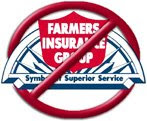Farmers Insurance customers are STILL waiting for their money
$117 million in Farmers refunds for Texas policyholders has been in limbo 7 years
By TERRENCE STUTZ / The Dallas Morning News
tstutz@dallasnews.com
AUSTIN – It's becoming known as the case of the missing insurance refunds.
Back in the fall of 2002, Farmers Insurance and state regulators agreed to resolve allegations that the company had overcharged customers with a $117 million settlement that included refunds and lower rates for nearly half a million policyholders.
Shortly after the agreement was announced, it was challenged by a group of Farmers policyholders, who insisted it was a bad deal for them. Although a state judge upheld the settlement, his decision was overturned by an appeals court and then taken to the Texas Supreme Court – which sent the legal dispute back down for further deliberations.
And so the case sits unresolved – going on seven years – and Farmers customers are still waiting for their money.
"Farmers has worked closely with the Texas Department of Insurance and remained ready to implement the agreed-on settlement for several years," said Michelle Levy, a spokeswoman for Farmers in Texas. "We're ready to take action, but there's nothing we can do until the courts have decided this."
'No longer viable'
Joe Longley, attorney for the Farmers policyholders, said the amount is a slap at policyholders.
"The settlement amount was a fraction of what Farmers took from their customers in Texas and what they are continuing to take. Refunds should be as much as 10 times" the $117 million settlement, he insisted.
The case was sent back to the 3rd Texas Court of Appeals in Austin in April 2007 and has been sitting there since.
Longley said he believes the case should be sent back to trial court because all the deadlines and conditions of the original settlement have long passed.
For a lot of reasons, he said, the settlement is "no longer viable" and must be redone.
The attorney general's office, meanwhile, is trying to have the settlement certified as a class action representing all Farmers customers in the state. Such a certification could invalidate other claims against the company.
Mold beginnings
The agreement came after the company had threatened to pull out of the Texas home insurance market because of massive mold losses. Company officials also were stinging from repeated attacks by Gov. Rick Perry, who made Farmers his favorite target in his 2002 race for governor.
Perry's appointed insurance commissioner at the time, Jose Montemayor, hammered out the agreement with Farmers, apparently without consulting the governor, who was unhappy with the terms.
In the years since, Farmers has stayed on the good side of the insurance department, even winning approval from current Commissioner Mike Geeslin last month to increase rates by double-digit percentages for hundreds of thousands of customers.
Farmers is now the third-largest property insurer in Texas behind State Farm and Allstate, providing coverage to about 714,000 homeowners.
Alex Winslow of Texas Watch, a consumer group active in insurance issues, said the stalled Farmers settlement is an example of the flawed system of regulation in Texas.
"Due process is a right for everybody, including insurance companies. But seven years is too long," Winslow said.
He compared the Farmers settlement to the "sweet deal" that Allstate received from the state last year when it settled allegations of overcharges in homeowners insurance. Allstate agreed to refund $51.6 million to its customers but was let off the hook for another $19.2 million by Geeslin, who defended the settlement as a "positive step" for ratepayers and the Texas insurance market.
Texas Watch is backing legislation filed by Democrats in the Senate and House that would require prior state approval of insurance rate increases. Currently, companies can raise rates once they notify the insurance department, which has the right to review those rates and decide whether they are justified.
Industry's stance
The insurance industry opposes prior government approval of rate increases.
"Instead of chasing the short-sighted goal of artificial price fixing, we should stick with the goal of creating a well-regulated competitive marketplace that can handle our state's tough climate efficiently and still attract companies and capital," said Beaman Floyd of the Texas Coalition for Affordable Insurance Solutions, an industry group.
Levy of Farmers emphasized that her company agreed to pay refunds to its customers and has been blocked from doing so by the class action intervention filed by Longley, an Austin attorney.
"They have left Farmers unable to implement the settlement, including retrospectively reducing rates and adjusting certain rating factors," she said.
Longley contends that the company's rates are still too high, which Levy disputed.
Longley also has a separate class action case against Farmers pending in federal court in Oklahoma City. That suit centers on management fees charged by Farmers that are reflected in premiums paid by customers in Texas and several other states.
The state's other long-running dispute over insurance rates, involving State Farm, is scheduled to go before the insurance commissioner at a March 30 hearing.
State Farm was accused by the state of overcharging customers and ordered to lower rates by 12 percent in the fall of 2003. The case has been in the courts since then, and State Farm has won some key victories. But the company is on the hook for more than $650 million in overcharges and penalty interest dating back nearly six years.
Source: dallasnews.com
Labels: class action, complaints, farmers insurance, homeowners insurance, texas


